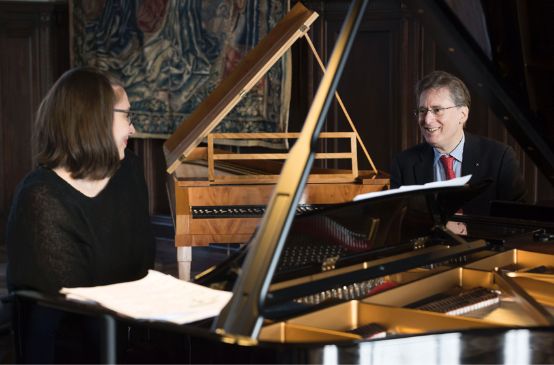I am responsible for opportunities
The American pianist and music researcher Robert Levin gave a master class as part of the Lucerne Piano Festival in mid-November. The central theme was once again the realization that the correct transposition of a musical text is not yet great art.

Two modern concert grand pianos stand side by side in the Knights' Hall of St. Charles Hall. Robert Levin has also had a historical fortepiano brought into the room, which is richly decorated with tapestries and ceiling paintings, in order to have even more possibilities for interpretation during his public masterclass in Meggen near Lucerne. And to show Chinese piano student Ke Ma how the bouncing basses in the Presto of Beethoven's Moonlight Sonata must have sounded at the time of the composer. The US-American, who switches effortlessly between English and German, explains the correct trills, discovers obvious printing errors in Johann Sebastian Bach's Urtext edition and illustrates Brahms' love pains by explaining harmonic turns in his second symphony. Intermezzo op. 117: "Brahms rarely shows his feelings so strongly. Here he literally breaks down."
It is also interesting for the 30 or so listeners when Robert Levin gives tips on playing technique or musically demonstrates that Bach stole some themes verbatim from Antonio Vivaldi. The atmosphere in the small hall is concentrated. Through the high windows you can see Lake Lucerne and snow-capped mountains. The Lucerne School of Music's annual piano masterclass, which is organized in collaboration with the Lucerne Festival Piano, is taking place for the fifth time in 2016. Leon Fleisher, Andreas Haefliger and Martin Helmchen have been the directors in recent years. Robert Levin is taking part for the second time after 2014. "With his background in musicology, he can give the students very valuable advice, especially on questions of interpretation," says Michael Kaufmann, Rector of the Lucerne University of Music. The Masterclass is financed by a special fund from the Lucerne School of Music Foundation. Five of the ten participants are Lucerne students of Konstantin Lifschitz. The others come from China, England, Germany and the USA. The Swiss Marija Bokor (born in 1992) has already attended Robert Levin's first master class. "He is so infectious in his enthusiasm. Many of the things he says have changed me a lot as a pianist. His way of thinking really rubs off." At the last course, she practiced a lot between lessons. This time, she spent almost the entire time listening to her colleagues' lessons. The 22-year-old Ke Ma became aware of Lucerne while still at school in China when she saw a video of Yuja Wang's interpretation of Prokofiev's Third Piano Concerto under Claudio Abbado at the KKL. She came across the masterclass via internet research. "I learned a lot of fundamental things from Robert Levin, for example about the optimal hand position. You can apply that to all pieces. I also found what he said about the different characters in Mozart interesting. And of course his anecdotes from musical life." During the breaks between the individual lessons, there is a lot of gossip. There is a warm atmosphere between the highly talented students. There is no sense of competition.
After the four-day course, Robert Levin is very satisfied. "I'm always pleased when the students realize for themselves what they can achieve." Regarding the fortepiano, which is on loan from the conservatory, he says: "It's simply important to be able to try out this instrument for yourself. The touch is completely different to a modern concert grand piano." Levin, who still looks youthful despite his 69 years, wants to awaken his students' interest in the "correctness of language". "I'm not responsible for the solutions, but for the possibilities. I want to open the windows," he says with a smile. For him, this also includes an interest in philology. There are differences between a North German staccato and a South German one. A fortissimo in Brahms is something completely different from one in Chopin. Ultimately, however, it's about much more than the flawless realization of musical notation. "Nothing happens without risk. As musicians, we must dedicate ourselves to the sacred duty of improving the lives of our fellow human beings." This moral dimension of art was conveyed to him by his teacher Nadia Boulanger. He also passes on this aspiration in the master class - and finds an open ear.
At the final concert in St. Luke's Church, Anna Zaychenka creates beautiful color changes in the late piano pieces op. 118 by Johannes Brahms. Kathy Tai-Hsuan Lee's eloquent interpretation of Beethoven packs a punch. Marija Bokor lets Debussy's Estampes appear as if behind fog. Ke Mas Chopin unfolds elegance and power, Gunel Mirzayeva's Bach combines rigor with joy of playing. After Daniel Evan's clear interpretation of the first movement of Chopin's 3rd Piano Sonata in B minor, the students go to the KKL with Robert Levin to listen to Grigory Sokolov at the opening concert of the Lucerne Festival Piano. And to realize that great art is much more than just technically correct piano playing.








